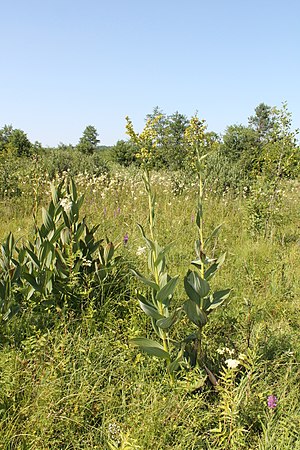Derman-Ostroh National Nature Park
| Derman-Ostroh National Nature Park | |
|---|---|
| Template:Lang-uk | |
 Derman-Ostroh National Nature Park | |
| Location | Ostroh Raion and Zdolbuniv Raion, Rivne Oblast, Ukraine |
| Nearest city | Ostroh, Rivne Oblast |
| Coordinates | 50°19′45″N 26°31′11″E / 50.32916667°N 26.51972222°E |
| Area | 1,647.6 hectares (4,071 acres; 16 km2; 6 sq mi) |
| Established | 2009 |
| Governing body | Ministry of Ecology and Natural Resources (Ukraine) |
| Website | http://npp-derman-ostroh.wixsite.com/nppdo |
Derman-Ostroh National Nature Park (Template:Lang-uk) sits in a river valley that separates the southern edge of the Polesian Lowland, and the northern edge of the Podolian Upland in northwestern Ukraine. The terrain is a mixture of pine-oak forest and marshy river lowlands. The park is in the administrative districts of Zdolbuniv Raion and Ostroh Raion, in the southernmost region of Rivne Oblast.[1]
Topography
The park is scattered in 22 sections along the Zbytynka River valley, which runs west-to-east between the Mizotsky Ridge (a part of the Volhynian Upland to the north) and the Kremenets mountains (to the south). The park is only a few kilometers northeast of Kremenets Mountains National Nature Park, and about 5 km west of the town of Ostroh. The valley is only 3-8 km wide, and the immediately surrounding high ground is only a few hundred meters above the valley floor. The valley floor itself is mostly an alluvial patchwork of waterlogged floodplain, first terrace, and sandy dunes.[1]
Individual sectors of the park include:
- Bushchansky Reserve, a complex and alder and pine forests, and reed-sedge swamps,
- Zbitensky Ornithological Reserve, a protected wetland set aside for breeding birds,
- Mizotsky Ridge (Reserve), a geological reserve,
- Zbytenka River floodplain (Reserve), a protected botanical reserve, with local cultural importance,
- Olhava (Reserve), a mixed forest of conifer and deciduous trees,
- The "Budka" Forest, with rare and medicinal plants
- "Zinkiv Stone" Monument, a mixed forest on the Kremenets Mountains side, with rock outcroppings,
- "Turova's grave" Monument, a section of hornbeam-oak forest, with a 400 year-old chestnut, and a 300 year-old Linden tree.

Climate and ecoregion
The official climate designation for the Desna-Starogutsky area is ""Humid continental climate - warm summer sub-type"" (Köppen climate classification Dfb), with large seasonal temperature differentials and a warm summer (at least four months averaging over 10 °C (50 °F), but no month averaging over 22 °C (72 °F).
Flora and fauna
All areas of the park are in the deciduous forest band of the Central European mixed forests ecoregion. About 50% of the region is forested, predominantly in pine and oak; there are also patches of beech and spruce. The Bashchansky bog in the park has the vegetation of lowland marsh, and is one of the Easternmost Middle European carbonate marshes.[2]
Public use
A 6.5 km educational ecological trail runs from the town of Busha on the northern ridge, south through the valley and up to a rocky prominence. There is also a 38 km ecotrail that runs along the Zbytinka river, and a 65 km bicycle trail that encircles the park. There are hotels and resorts nearby for overnight stays.[1]
See also
References
- ^ a b c "Derman-Ostroh National Nature Park" (in Ukrainian). Official Park Site. Retrieved January 10, 2019.
- ^ "Vegetation - Derman-Ostroh National Nature Park" (in Ukrainian). Official Park Site. Retrieved January 10, 2019.


